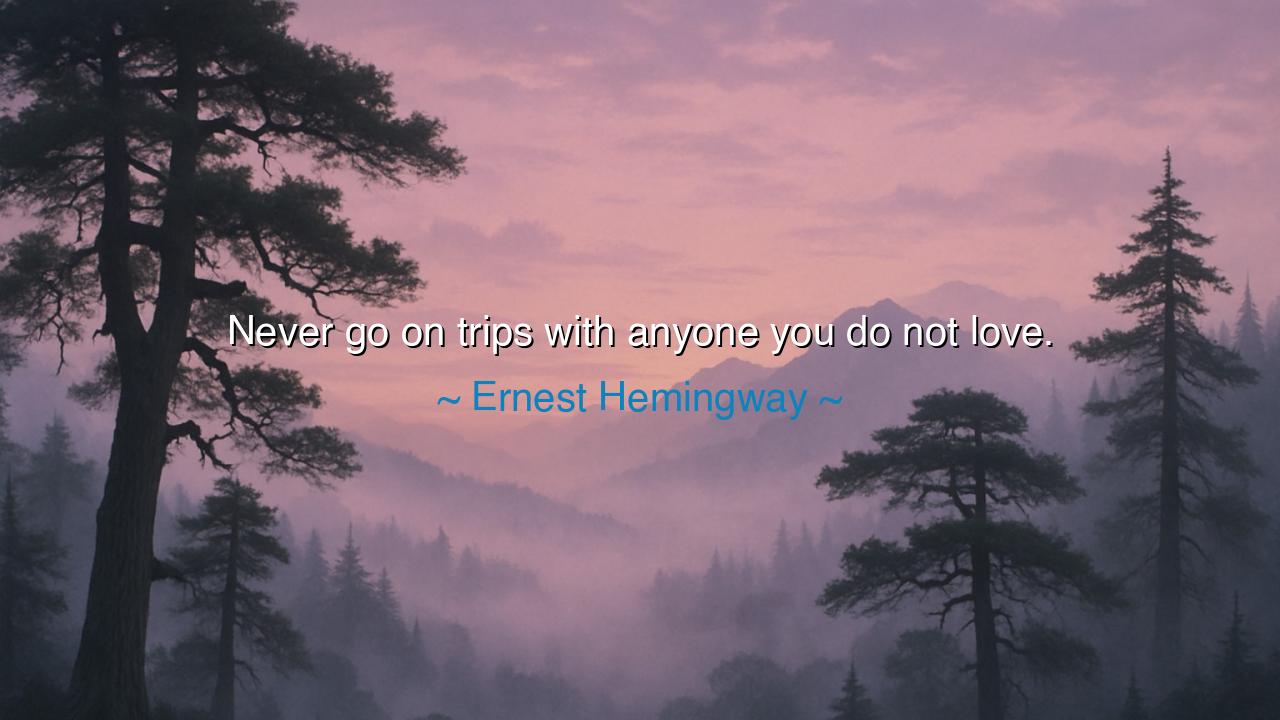
Never go on trips with anyone you do not love.






“Never go on trips with anyone you do not love.” Thus wrote Ernest Hemingway, the wanderer, the warrior, and the poet of the human heart. His words are simple as sunlight yet carry the weight of deep experience. For in this brief command lies not merely a warning about travel, but a philosophy of companionship, of trust, and of the sacredness of shared journey. Hemingway, who crossed oceans and continents, who hunted in Africa, fished in Cuba, and wrote in Paris, knew that the road and the sea reveal a person more surely than any drawing room ever could. A journey strips away masks; it exposes the soul. And therefore, he teaches: travel only with those you love, for only love can survive such revelation.
To love here does not mean mere romance, nor even friendship in its ordinary sense. It means a deep respect, a tenderness of understanding — the kind of bond that can endure fatigue, hunger, silence, and strain. On a journey, one’s virtues and vices alike are laid bare: patience or pride, kindness or cruelty, courage or cowardice. The small irritations of daily life are magnified, and the masks we wear among crowds fall away. A person’s true character is revealed when plans collapse, when the weather turns foul, when there is no comfort to hide behind. And so, Hemingway warns, if love does not bind you to your companion, the road will break whatever false peace you had imagined between you.
Hemingway himself was a man of restless motion. He fought in wars, roamed through mountains, and crossed seas in pursuit of adventure and truth. Yet in his travels he learned that the company you keep matters as much as the destination itself. His life was marked by great loves and great losses, and he knew the difference between solitude chosen and loneliness endured. To journey with one unloved is to turn the road into exile; to journey with one loved is to make even hardship a kind of home. Thus, his words are not cynical, but compassionate — an urging to guard the heart and choose one’s companions wisely.
Consider the tale of Robert Falcon Scott, the British explorer who led the ill-fated expedition to the South Pole. The journey was brutal — endless cold, starvation, and despair. Yet Scott’s final writings did not curse his fate; he spoke instead with gratitude for his men, for their loyalty and love unto death. “We are weak, writing in the cold,” he wrote, “but we are not despondent.” What sustained them in that frozen hell was not ambition, but the bond between them — a fellowship stronger than frost or hunger. Their love for one another turned tragedy into nobility. In this way, Scott’s story echoes Hemingway’s truth: that love sanctifies the journey, even when it ends in sorrow.
Hemingway’s quote also carries a deeper spiritual current. For life itself is the greatest journey, and we are all travelers upon it. To “never go on trips with anyone you do not love” is to remember that our days are too precious to waste in the company of those who drain our spirit or darken our joy. Life’s road is long, and it is filled with storms; therefore, surround yourself only with those who help you steer toward light. The journey of the soul, like that of the body, requires companions of heart — those who can share silence without unease, laughter without cruelty, and hardship without complaint.
And yet, Hemingway’s wisdom is not without cost. To live by it requires courage — the courage to walk alone rather than in false company, to endure solitude rather than suffer the slow erosion of one’s peace. The ancients said that one faithful friend is worth more than a thousand acquaintances. Hemingway, with his blunt simplicity, teaches the same truth: it is better to travel alone in truth than together in pretense. For love — whether romantic, familial, or brotherly — is the only bond that can turn travel into transformation, and endurance into joy.
So, O seekers of the path, take heed of this wisdom: choose your companions not for convenience, but for connection. When you set forth on any road — whether across continents or through the long landscape of your years — ask yourself: Do I walk beside one who lifts my heart, who shares my burdens, who makes even silence golden? If the answer is no, turn back; wait for love. For without love, even the most beautiful journey becomes barren; but with love, even the hardest road becomes radiant.
For in the end, as Hemingway knew, the world is vast and the heart is fragile. To walk with one you love is to carry warmth through the cold, to find laughter in the unknown, and to see beauty even in the broken places. Therefore, never go on trips with anyone you do not love, for the road will test your heart — and only love will see you safely home.






AAdministratorAdministrator
Welcome, honored guests. Please leave a comment, we will respond soon